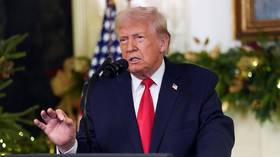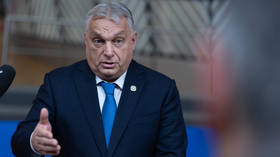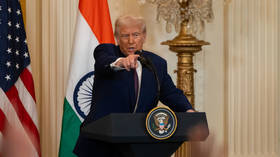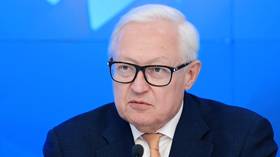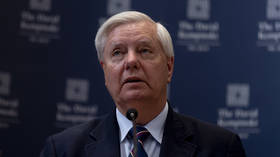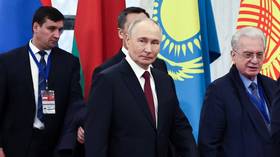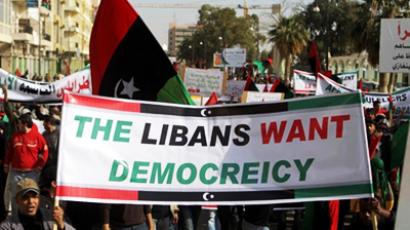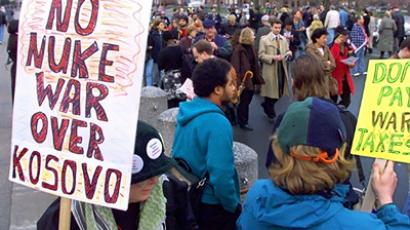“Those who started the war against Libya aren't aiming to help the opposition win”
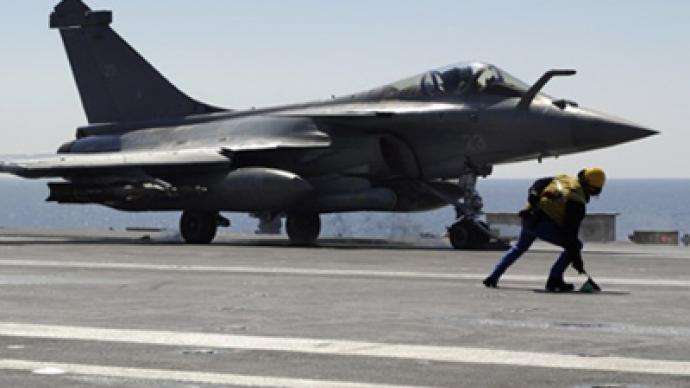
Why was Libya chosen as the target for coalition strikes? Who wants to destabilize the Mediterranean and why? What consequences will it have for the world? RT asked Geydar Dzhemal, political scientist and chairman of the Islamic Committee of Russia.
RT: The mass media is focused on Libya, where coalition strikes are taking place. Where do you think the most important events are happening at the moment?Geydar Dzhemal: First of all, it is Yemen and Bahrain. The regime changes in these countries are opening the way for the biggest prize in Arab revolutions – Saudi Arabia. If the current regime falls in Saudi Arabia, the US will lose any control over ultra-active members of the political tapestry of the Arab streets – Islamic radicals and fundamentalists. RT: How does the US influence Arab streets via Saudi Arabia?GD: It is no secret that many components of political Islam are connected to Saudi Arabia in one way or another, with its network of theologians, ulama, who are either directly controlled by the House of Saud or pretend that they are independent from the family, but they still manipulate their followers and determine their sect-like behavior. And behind these Koran teachers there are radicals from the streets, who are covertly used by the West. If the Saudi regime falls, thousands of political prisoners will be freed. Thousands of opposition activists who now live abroad will come back to Saudi Arabia – most of them stand on the platform of Islam. Many of them live in the UK. The way to Saudi Arabia opens up through Yemen and Bahrain. Opposition in Yemen has been somewhat successful. RT: Why was Libya chosen as the target of military invasion?GD: There are several reasons for that. First of all, Obama needs to destabilize Europe and even more than that – have an explanation for such destabilization, which will inevitably happen. The West is on the verge of a new recession. People are not buying real estate. They are spending money on everyday needs instead. If we take into account inflation and recession on the real estate market, we will see that consumer demand has gone down 20-25% in 2011. That is a huge number. It shows that consumers don’t trust the future, the dollar, the political situation both in the world and in the US. Secondly, the only remedy in this classic monetarism system is to print more money. But this will be followed by a new wave of inflation and the consumers’ mistrust will spiral. It is a vicious cycle. It has to be justified somehow, Obama has to justify the fact that the American economy basically failed everyone on the way out of the crisis. It has to be justified before the mass media and the people. Europe is facing a recession, and it will be more abrupt than in America. Besides the economic recession they are facing political change – prominent politicians of the 1990s are stepping down. And now it is becoming obvious that social programs are not working as they used to. Many people are becoming a burden, immigrants first of all. But it’s not clear what to do with them in the framework of political correctness we used to have. For this you need to get rid of political correctness, reformulate the mind of the layman, and actually kick up a war against diasporas supported by the majority of laymen. You can do this only on condition of aggression against the Arab Mediterranean, against Maghreb and on condition of “sort of a response” from the Mediterranean. To fulfill such tasks easier it is most favorable to have acts of terror. The Mumbai explosion was the first trial step of that kind. About a year ago in the newspapers there were information leaks about preparation for an explosion at a French power station. Today, in relation to the French initiative of Libya bombardments, there is a logical conclusion that it was France against whom such operations had been performed. If the situation continues to be like that, France will have to raise the question of the forceful removal of diasporas from the country. It will be a change in both social and cultural climate, because it will acquire the character of a police operation against migrants in this or that way. Similar processes are taking place in the West: Belgium, Austria, Scandinavia – we see an outburst of anti-migrant and anti-diaspora moods acquiring political forms.Probably on the results of this conflict with Libya we will witness a reformatting of the whole EU political space.RT: Iran gives almost no estimation of the situation. Does Iran have a vision of the situation?GD: Iran has a vision, but it’s in a difficult situation. Supporting Gaddafi would be absurd. For the past six years, Gaddafi was far from being the author of the Green Book or the leader of Jamahiriya (translated as "state of the masses" – RT), but a person who can be called a Libyan Yeltsin. RT: What actions did Gaddafi undertake after Iraq’s bombing? GD: During the past six years they have been visibly stepping aside from the Jamahiriya principles, turning Libya into a neo-liberal bureaucratic state, privatizing state corporations, and encouraging corruption. Libya was on its way to becoming closer with the West. But the rhetoric was still anti-Israeli, anti-Western, but in reality it was cooperation with Israel. Gaddafi did not make a single step in the direction of Palestine. However he was satisfying the most unreasonable demands of the Western corporations.Russian corporations in Libya had to put up with a 10-12% share of oil, while Western corporations ranged between 20-52%.Western companies wanted privatization of the major state oil corporation, but Gaddafi would not agree. It would be strange for Iran to support Gaddafi, moreover he was seriously at fault in front of Hezbollah, the Amal movement, the Palestinian movement – he killed a number of people who were hiding on his territory. But Iran cannot support the West either, because it’s just impossible. So the situation is complicated dialectically. Representatives of political Islam and Islamic Radicalism are against Gaddafi. This could have made it associate with them. But they receive the West’s support, have to accept it, they are politically disoriented. Iran’s position is this. Condemning Gaddafi – his regime, him personally, and as a power holder, Iran warns the Libyan people that they should not trust the West, because the West does not list among its tasks to help their opposition. Its task is to keep the healthy part of the opposition from reaching power in the end. The West could have helped the opposition in a different way – massively transport weapons, money, and training staff – and not of western origin by the way – so that this kind of opposition could have won. The bombardment was not aimed at letting the forces in Benghazi enter and occupy Tripoli. The West fulfills the task of disintegration and disorientation of all the forces who are now on the Libyan scene. That’s why Iran says – we do not support Gaddafi, but the Libyan people should come together against the West. It’s the only way of explaining things when one scoundrel fights against another. Those who started a war against Libya are more dangerous than those in it.RT: What are the Palestinians’ and Israelis’ prospects in the crisis conditions? GD: Israel used the situation to make as much harm as possible to Palestinians on the quite. But upon the whole I think that the situation will objectively work for Palestine and against Israel. The processes taking place in Israel speak for a serious political crisis, in particular – the verdict to the President Moshe Katsav. The verdict has nothing to do with political motives, but we are to understand that Clinton and Monica Levinsky’s scandal was not a shameful fact of the yellow press, but a political scandal for which they had chosen such a form. With people of his position, nothing non-political may happen. Assange, Clinton, and Katsav received political claims in the form of sexual. In this case, the Israeli elite were squaring accounts with each other. It’s related to the fact that the Israeli situation has aggravated a lot.
Nadezhda Kevorkova, RT


